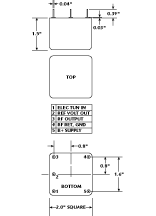An OCXO with Rubidium Oscillator Performance
MTI-Milliren Technologies Inc.
Newburyport, MA
Precision crystal oscillators are widely used in systems for navigation, such as Global Positioning System (GPS) and cellular telephone applications. In many ways, the crystal oscillator is the cornerstone in determining critical performance such as bit error rates, signal-to-noise ratios, time transfer errors and calibration intervals. Achieving these performance levels requires a high precision oscillator that also is compact, reliable and cost effective.
The 260 series high precision quartz crystal oscillators have been accepted worldwide as a timing and frequency reference standard directly replacing Rubidium clocks. These oven-controlled crystal oscillators (OCXO) have found applications in telephony, GPS receivers, time-division multiple access personal communications system base stations, and wideband code-division multiple access and quasi-synchronous radios. These OCXOs maintain performance characteristics comparable to Rubidium oscillators without their high cost and inherent wear out, making them cost-effective alternatives that simplify system design significantly. A performance comparison of a 260 series 5 MHz OCXO and a Rubidium oscillator is listed in Table 1 .
|
Table I | ||
|
Parameter |
Rubidium Oscillator |
260 Series 5 MHz SC OCXO |
|
Thermal Stability |
<2.0e-10 |
<2.0e-10 |
|
Temperature Range (° C) |
-10 to +60 |
-30 to +70 |
|
Aging/day |
<2.0e-12 |
* |
|
Phase Noise (dBc/Hz) | ||
|
At 1 KHz |
-85 |
-110 |
|
At 100 KHz |
-145 |
-160 |
|
Power Consumption (W) |
25 |
2.7 steady state |
|
Useful Life (years) |
7 |
20 |
|
Dimension (mm) |
58 X 84 X 64 |
50.8 X 50.8 X 38.1 |
|
Weight (g) |
1300 |
150 |
|
Cost (in quantity) |
>$1500 |
<$500 |
|
Reliability (approximate mean time between failures) (hrs) |
|
$350,000** |
|
*After one or two months of continous operation (typ) | ||
The 260 series OCXOs utilize SC-cut crystals in a double-oven environment. Typical specifications for the model 260-0504 5 MHz OCXO include thermal stability of 2.0e–10 over a –30° to +70°C temperature range. The OCXO’s thermal stability cycled
from –30° to +70° to –30°C in 10° steps is shown in Figure 1 . Aging for this oscillator is 5.0e–11 per day, 1.5e–9 per month and 1.0e–8 per year. Figure 2 shows the oscillator’s aging characteristics. Short-term stability is 1.0e–12 for one and 10 seconds. Figure 3 shows the oscillator’s typical phase noise.



The oscillator’s output is a nominal 9 dBm ±2 dB sine wave. Harmonics and spurious are –30 and –80 dBc, respectively. Sensitivity to ±5 percent supply voltage changes (pushing) is 2.0e–11 and load sensitivity (pulling) for ±5 percent load impedance variations is 5.0e–11. Warm-up time for the oscillator is specified at 15 minutes and frequency variation (df/f) for a 60-minute reference period is 2.0e–8. Frequency retrace after 24 hours off and two hours on is 5.0e–9.
The model 260-0504 oscillator typically requires 12 W of warm-up power and 2.7 W of continuous power using a 12 V DC supply. Reference voltage output is 5.9 to 6.5 V, and a 0 to 6 V tuning voltage is required to adjust the oscillator frequency electrically. The tuning port has a negative tuning slope with a 10 percent linearity and 100 Hz bandwidth. The 500 kW tuning port impedance electrically tunes the oscillator frequency from ±5.0e–7 minimum to ±1.0e–6 maximum.
 The 260 series high stability/reliability OCXOs are available in the 32 kHz to 30 MHz frequency range with thermal stabilities from 2.0e–10 to 4.0e–9 over an operating temperature range of –40° to +80°C. Available outputs are HCMOS/ACMOS or 0 to +13 dBm sine wave. The oscillators are capable of operating from +11 to +28 V DC with tuning voltages of –10 to +10 V DC and are housed in a 2.0" x 2.0" x 1.5" rectangular package with six electrical pins on the bottom surface, as shown in Figure 4 . Reliability is enhanced by the use of robotically assembled surface-mounted components, and automated test results are maintained in a database by the manufacturer for ongoing service.
The 260 series high stability/reliability OCXOs are available in the 32 kHz to 30 MHz frequency range with thermal stabilities from 2.0e–10 to 4.0e–9 over an operating temperature range of –40° to +80°C. Available outputs are HCMOS/ACMOS or 0 to +13 dBm sine wave. The oscillators are capable of operating from +11 to +28 V DC with tuning voltages of –10 to +10 V DC and are housed in a 2.0" x 2.0" x 1.5" rectangular package with six electrical pins on the bottom surface, as shown in Figure 4 . Reliability is enhanced by the use of robotically assembled surface-mounted components, and automated test results are maintained in a database by the manufacturer for ongoing service.
Although many standard models are maintained in stock, most custom oscillators require special modifications and up to six weeks to deliver. Additional information can be obtained from the company’s Web site at http://www.mti-milliren.com.
MTI-Milliren Technologies Inc., Newburyport, MA
(978) 465-6064.
